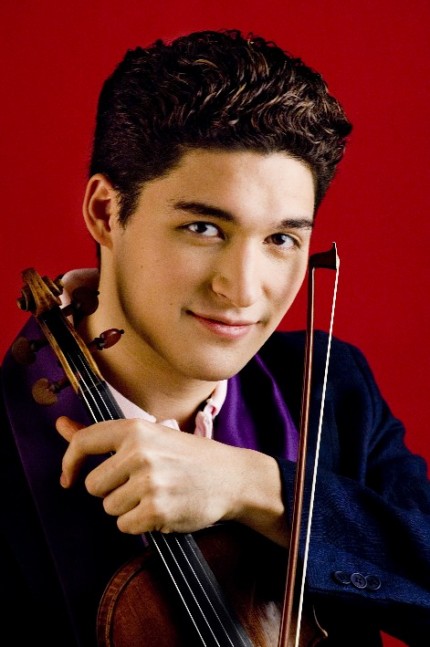Violinist sparks a golden night at Ravinia

Following up a memorable Brahms Fourth Friday night at Ravinia, Christoph Eschenbach and the Chicago Symphony Orchestra managed to serve up equally imposing Dvořák performances at the summer festival on Saturday.
But it was Erik Schumann who provided the crucial solo sparks with an electrifying account of Erich Wolfgang Korngold’s Violin Concerto.
A Steans Music Institute alumnus, Schumann has appeared three times previously at the festival, and is mentored by Eschenbach, who has an impressive track record in spotting and promoting up-and-coming talent.
Korngold’s concerto came in for much stick from critics at its 1947 premiere (“more corn than gold,” etc.), in large part due to the Austrian composer mining melodic material from several of his Warner Brothers film scores, notably Another Dawn, Anthony Adverse and The Prince and the Pauper.
Korngold’s concerto may indeed be “movie music” but what glorious movie music it is, with several soaring themes well suited to the violin. And if not the most profound work ever written, Korngold’s concerto is hugely enjoyable and offers great opportunities for a young virtuoso like Schumann.
The German violinist’s tone is not large or particularly penetrating but his technique is sterling and unassailable. Schumann proved fully in synch with the rhapsodic expression of the opening movement from the rising opening theme, giving Korngold’s rich melodies their due in a lean, tasteful style eschewing excessive vibrato. The central Romance was especially inspired, rendered by Schumann with melting tenderness, and the finale edge-of-the-seat thrilling as the soloist tore through the myriad landmines with technique to burn.
Eschenbach’s accompaniment was on the same level, closely knit with his soloist and eliciting layered, nuanced textures. The conductor plumbed a striking degree of mystery in the Romance and gave the music its silver-screen sumptuousness at climaxes without turning soupy or peaking too soon.
Music of Dvořák framed the concerto. The evening led off with a rousing account of the perennial Carnival Overture, complemented with a tender rendering of the nocturnal middle section.
Dvořák’s Symphony No. 8 is hardly terra incognita but Saturday night’s probing performance made one appreciate anew the expressive range and emotional depth beneath the surface tunefulness. Eschenbach elicited a brilliant performance that was exhilarating in its bravura moments while light-footed and lilting, as in the waltz-like third movement.
Yet Eschenbach also sensitively plumbed the vein of introspection and sadness in this music, particularly the enigmatic, somewhat schizoid Adagio, with its alternation of bleak darkness and pastoral lyricism.
The CSO musician were at their considerable finest Saturday, which is saying something. Once again, Eugene Izotov’s oboe playing and Mathieu Dufour’s flute made poetry out of Dvořák’s rustic melodies with Dufour flying through the lightning solo of the final movement like child’s play. The cellos were especially resplendent in their highlighted passages with dark, burnished playing throughout.
Posted in Uncategorized




